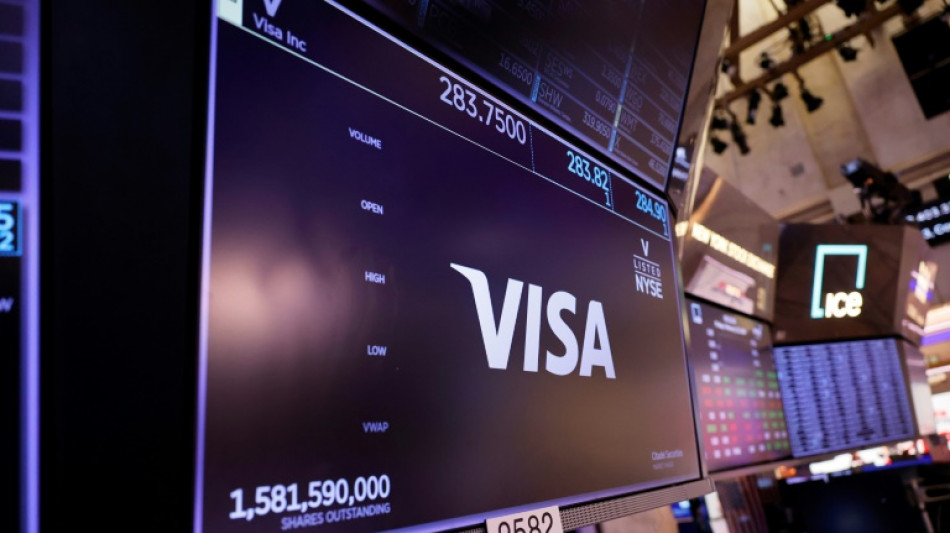
-
 Loaf behind bars: Aussie inmate says Vegemite a human right
Loaf behind bars: Aussie inmate says Vegemite a human right
-
In film's second act, 'Wicked' goes beyond Broadway musical

-
 Asian markets track Wall St down with Nvidia, US jobs in view
Asian markets track Wall St down with Nvidia, US jobs in view
-
Scott Boland: the best 'spare' fast bowler around

-
 Fire and Ashes: England bank on fast bowling barrage in Australia
Fire and Ashes: England bank on fast bowling barrage in Australia
-
North Korea says Seoul-US sub deal will trigger 'nuclear domino' effect

-
 Education for girls hit hard by India's drying wells
Education for girls hit hard by India's drying wells
-
Haitian gangs getting rich off murky market for baby eels

-
 Trump says will talk to Venezuela's Maduro, 'OK' with US strikes on Mexico
Trump says will talk to Venezuela's Maduro, 'OK' with US strikes on Mexico
-
Oscar Piastri wins Australia's top sports honour

-
 'Severely restricted': Russia's Saint Petersburg faces cultural crackdown
'Severely restricted': Russia's Saint Petersburg faces cultural crackdown
-
Polish PM denounces 'sabotage' of railway supply line to Ukraine

-
 UK toughens asylum system with radical overhaul
UK toughens asylum system with radical overhaul
-
Carney's Liberals pass budget, avoiding snap Canada election

-
 LeBron back in training, edges closer to Lakers return
LeBron back in training, edges closer to Lakers return
-
Climate talks run into night as COP30 hosts seek breakthrough

-
 Germany and Netherlands lock up World Cup spots in style
Germany and Netherlands lock up World Cup spots in style
-
Germany's Woltemade hopes for 2026 World Cup spot after scoring again

-
 Germany 'send message' with Slovakia rout to reach 2026 World Cup
Germany 'send message' with Slovakia rout to reach 2026 World Cup
-
Trump unveils fast-track visas for World Cup ticket holders

-
 Netherlands qualify for World Cup, Poland in play-offs
Netherlands qualify for World Cup, Poland in play-offs
-
Germany crush Slovakia to qualify for 2026 World Cup

-
 Stocks gloomy on earnings and tech jitters, US rate worries
Stocks gloomy on earnings and tech jitters, US rate worries
-
'In it to win it': Australia doubles down on climate hosting bid

-
 Former NFL star Brown could face 30 yrs jail for shooting case: prosecutor
Former NFL star Brown could face 30 yrs jail for shooting case: prosecutor
-
Fate of Canada government hinges on tight budget vote

-
 New research measures how much plastic is lethal for marine life
New research measures how much plastic is lethal for marine life
-
Mbappe, PSG face off in multi-million lawsuit

-
 EU defends carbon tax as ministers take over COP30 negotiations
EU defends carbon tax as ministers take over COP30 negotiations
-
McCartney to release silent AI protest song

-
 Stocks tepid on uncertainty over earnings, tech rally, US rates
Stocks tepid on uncertainty over earnings, tech rally, US rates
-
Louvre shuts gallery over ceiling safety fears

-
 'Stranded, stressed' giraffes in Kenya relocated as habitats encroached
'Stranded, stressed' giraffes in Kenya relocated as habitats encroached
-
US Supreme Court to hear migrant asylum claim case

-
 Western aid cuts could cause 22.6 million deaths, researchers say
Western aid cuts could cause 22.6 million deaths, researchers say
-
Clarke hails Scotland 'legends' ahead of crunch World Cup qualifier

-
 S.Africa says 'suspicious' flights from Israel show 'agenda to cleanse Palestinians'
S.Africa says 'suspicious' flights from Israel show 'agenda to cleanse Palestinians'
-
South Korea pledges to phase out coal plants at COP30

-
 Ex-PSG footballer Hamraoui claims 3.5m euros damages against club
Ex-PSG footballer Hamraoui claims 3.5m euros damages against club
-
Mbappe, PSG in counterclaims worth hundreds of millions

-
 Two newly discovered Bach organ works unveiled in Germany
Two newly discovered Bach organ works unveiled in Germany
-
Stocks lower on uncertainty over earnings, tech rally, US rates

-
 Barca to make long-awaited Camp Nou return on November 22
Barca to make long-awaited Camp Nou return on November 22
-
COP30 talks enter homestretch with UN warning against 'stonewalling'

-
 France makes 'historic' accord to sell Ukraine 100 warplanes
France makes 'historic' accord to sell Ukraine 100 warplanes
-
Delhi car bombing accused appears in Indian court, another suspect held

-
 Emirates orders 65 more Boeing 777X planes despite delays
Emirates orders 65 more Boeing 777X planes despite delays
-
Ex-champion Joshua to fight YouTube star Jake Paul

-
 Bangladesh court sentences ex-PM to be hanged for crimes against humanity
Bangladesh court sentences ex-PM to be hanged for crimes against humanity
-
Trade tensions force EU to cut 2026 eurozone growth forecast


Visa's 24/7 war room takes on global cybercriminals
In the heart of Data Center Alley -- a patch of suburban Washington where much of the world's internet traffic flows -- Visa operates its global fraud command center.
The numbers that the payments giant grapples with are enormous. Every year, $15 trillion flows through Visa's networks, representing roughly 15 percent of the world's economy. And bad actors constantly try to syphon off some of that money.
Modern fraudsters vary dramatically in sophistication.
To stay ahead, Visa has invested $12 billion over the past five years building AI-powered cyber fraud detection capabilities, knowing that criminals are also spending big.
"You have everybody from a single individual threat actor looking to make a quick buck all the way to really corporatized criminal organizations that generate tens or hundreds of millions of dollars annually from fraud and scam activities," Michael Jabbara, Visa's global head of fraud solutions, told AFP during a tour of the company's security campus.
"These organizations are very structured in how they operate."
The best-resourced criminal syndicates now focus on scams that directly target consumers, enticing them into purchases or transactions by manipulating their emotions.
"Consumers are continuously vulnerable. They can be exploited, and that's where we've seen a much higher incidence of attacks recently," Jabbara said.
- Scam centers -
The warning signs are clear: anything that seems too good to be true online is suspicious, and romance opportunities with strangers from distant countries are especially dangerous.
"What you don't realize is that the person you're chatting with is more likely than not in a place like Myanmar," Jabbara warned.
He said human-trafficking victims are forced to work in multi-billion-dollar cyber scam centers built by Asian crime networks in Myanmar's lawless border regions.
The most up-to-date fraud techniques are systematic and quietly devastating.
Once criminals obtain your card information, they automatically distribute it across numerous merchant websites that generate small recurring charges -- amounts low enough that victims may not notice for months.
Some of these operations increasingly resemble legitimate tech companies, offering services and digital products to fraudsters much like Google or Microsoft cater to businesses.
On the dark web, criminals can purchase comprehensive fraud toolkits.
"You can buy the software. You can buy a tutorial on how to use the software. You can get access to a mule network on the ground or you can get access to a bot network" to carry out denial-of-service attacks that overwhelm servers with traffic, effectively shutting them down.
Just as cloud computing lowered barriers for startups by eliminating the need to build servers, "the same type of trend has happened in the cyber crime and fraud space," Jabbara explained.
These off-the-shelf services can also enable bad actors to launch brute force attacks on an industrial scale -- using repeated payment attempts to crack a card's number, expiry date, and security code.
The sophistication extends to corporate-style management, Jabbara said.
Some criminal organizations now employ chief risk officers who determine operational risk appetite.
They might decide that targeting government infrastructure and hospitals generates an excessive amount of attention from law enforcement and is too risky to pursue.
- 'Millions of attacks' -
To combat these unprecedented threats, Jabbara leads a payment scam disruption team focused on understanding criminal methodologies.
From a small room called the Risk Operations Center in Virginia, employees analyze data streams on multiple screens, searching for patterns that distinguish fraudulent activity from legitimate credit card use.
In the larger Cyber Fusion Center, staff monitor potential cyberattacks targeting Visa's own infrastructure around the clock.
"We deal with millions of attacks across different parts of our network," Jabbara noted, emphasizing that most are handled automatically without human intervention.
Visa maintains identical facilities in London and Singapore, ensuring 24-hour global vigilance.
R.Shaban--SF-PST


